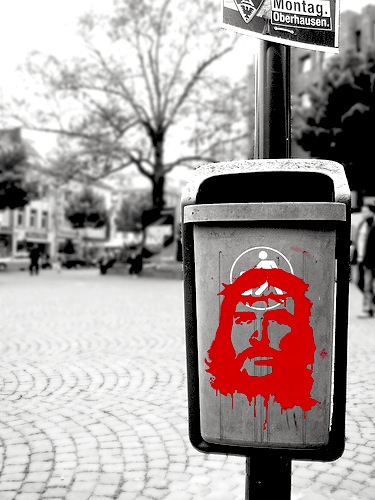By Jimmy McCarty
 A while back there was an article here asking if Jesus was a revolutionary. The answer is a resounding, “Yes!” Jesus turned the cultural, religious, and political world upside down. You bet he was a revolutionary! According to the article the dictionary definition of revolutionary is “constituting or bringing about a major or fundamental change.” I can’t think of any more major or fundamental change than what Jesus began.
A while back there was an article here asking if Jesus was a revolutionary. The answer is a resounding, “Yes!” Jesus turned the cultural, religious, and political world upside down. You bet he was a revolutionary! According to the article the dictionary definition of revolutionary is “constituting or bringing about a major or fundamental change.” I can’t think of any more major or fundamental change than what Jesus began.
At the end of the article the author seems to have come to the conclusion that we should not call Jesus a revolutionary because “we need to be cautious of calling Jesus something He never called Himself.” Interestingly, we call Jesus things he never called himself all the time. He never called himself the second person of the Trinity. He never called himself our “best friend” or our “lover.” He never called himself Lord of Lords, King of Kings or Prince of Peace. He never called himself the suffering servant. He never even called himself the titles the author of the article gave him: Lord or Savior.
Interestingly, the author of the article quotes from Luke 4 where Jesus says his mission is to liberate the oppressed and bring about a societal redistribution of wealth (in his reference to the year of Jubilee). That sounds like revolutionary language to me. The author also sends us to read a piece from Frank Viola which reads:
“Someone once said that ‘a rebel attempts to change the past; a revolutionary attempts to change the future.’ Jesus Christ brought drastic change to the world. Change to humanity’s view of God. Change to God’s view of humankind. Change to men’s view of women. Our Lord came to bring radical change to the old order of things, replacing it with a new order. He came to bring forth a new covenant-a new kingdom-a new birth-a new race-a new species-a new culture-and a new civilization.“
Viola is right. Jesus subverted everything. He touched lepers. He talked to women during the daytime. He told the first they were really last, and the last they were really first. He ate with social outcasts, and thus declared them equal. He inaugurated the reign of God’s kingdom. He disrupted business activities at the temple (which nearly all scholars agree is what got him killed). When he rode into Jerusalem on a donkey he mocked the entrance of Caesars and military generals. When he said, “Give to Caesar what is Caesar’s and to God what is God’s,” he wasn’t maintaining the status quo but subverting it. He argued that the image of Caesar gives Caesar the right to coins, and implicitly argued that the image of God in all gives God the right to everyone’s entire being. Caesar can have the money. God wants the body, mind, soul and heart. Jesus was killed as a political criminal! How much more revolutionary can you get?
Jesus was without a doubt a revolutionary, but he wasn’t just a revolutionary. He was a revolutionary of revolutionaries. He didn’t just turn the entire social, religious and political order on its head. He did it in a way different from every other attempt before him. Maybe that is why we are hesitant to give Jesus the title “revolutionary.” When we think of revolutionaries we think of armed revolt, funny hats, and the color red. Jesus, however, led a nonviolent revolution marked by service. His revolution doesn’t come by a sword, gun or bombs, but by a towel and turning the other cheek. See, Jesus was a revolutionary, but he wasn’t only a revolutionary of society. He even began a revolution of revolution. He had Zealots among his disciples. These were revolutionaries “par excellence.” They wielded swords and daggers and sought to overthrow Roman rule. Jesus liked their zeal, and to some extent their goal, but taught them new methods and a broader goal that subverted Rome but also included reconciliation with Romans.
Jesus wasn’t just a revolutionary. He was the ultimate revolutionary. And now his call, “Follow me,” seems a whole lot more radical.
If you liked this article, check out: The Missionary Heart of Jesus
 Jimmy is a graduate of Pepperdine University and Claremont School of Theology where he has studied religion and ethics. He will be attending Emory University in the Fall to pursue a Ph.D. in Christian Ethics, and will be spending the summer with his beautiful wife Desiree serving the least of these in the slums of Nairobi, Kenya. He blogs at Seeking First the Kingdom.
Jimmy is a graduate of Pepperdine University and Claremont School of Theology where he has studied religion and ethics. He will be attending Emory University in the Fall to pursue a Ph.D. in Christian Ethics, and will be spending the summer with his beautiful wife Desiree serving the least of these in the slums of Nairobi, Kenya. He blogs at Seeking First the Kingdom.
